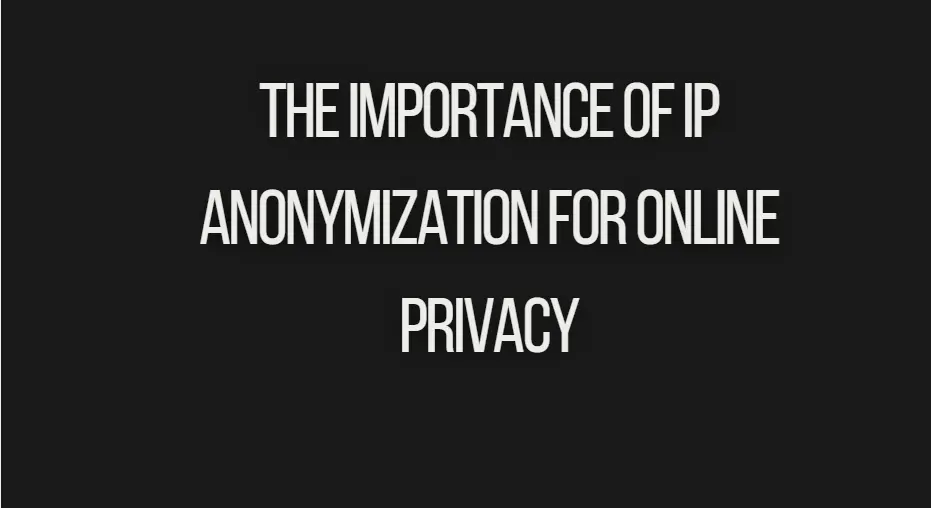In today’s digital age, online privacy has become a paramount concern for individuals and organizations alike. With the rapid growth of the internet and the increasing amount of personal data shared online, protecting this information has never been more critical. One of the key strategies for enhancing online privacy is IP anonymization. This article explores the significance of IP anonymization, its underlying mechanisms, and its role in safeguarding user privacy.
Table of Contents
ToggleUnderstanding IP Addresses and Their Role in Online Privacy
An IP address (Internet Protocol address) is a unique identifier assigned to each device connected to the internet. It serves as a digital address that allows devices to communicate with one another. IP addresses can be either IPv4 or IPv6, with the latter providing a larger address space to accommodate the growing number of devices online.
While IP addresses are essential for internet functionality, they also pose a significant risk to user privacy. When an individual accesses a website, their IP address can be logged and tracked, revealing their approximate geographic location and online activities. This data can be exploited by various entities, including advertisers, hackers, and even government agencies.
Why IP Anonymization Matters
Protecting Personal Information
The primary purpose of IP anonymization is to protect personal information. By masking or altering the IP address, users can browse the internet without revealing their true identity. This is particularly important in an era where data breaches and identity theft are rampant. Anonymizing IP addresses helps safeguard sensitive information from malicious actors who might exploit it for nefarious purposes.
Compliance with Data Protection Regulations
As governments worldwide implement stricter data protection laws, organizations must adapt their practices to remain compliant. Regulations such as the General Data Protection Regulation (GDPR) in Europe and the California Consumer Privacy Act (CCPA) in the United States emphasize the importance of protecting user data. Anonymizing IP addresses is a proactive step that organizations can take to ensure compliance with these regulations, minimizing the risk of hefty fines and legal repercussions.
Enhancing User Trust
In an age where consumers are increasingly aware of their online privacy rights, building trust is essential for businesses. By implementing IP anonymization techniques, companies can demonstrate their commitment to protecting user data. This not only fosters trust but also encourages customer loyalty. Users are more likely to engage with businesses that prioritize their privacy and take concrete steps to protect their information.
How IP Anonymization Works
Techniques for Anonymizing IP Addresses
There are several methods for anonymizing IP addresses, each with its own advantages and limitations. Some of the most common techniques include:
- Proxy Servers: A proxy server acts as an intermediary between a user’s device and the internet. When a user connects to the internet through a proxy, their requests are routed through the proxy server, masking their IP address. While this provides a level of anonymity, users must trust the proxy operator, as they could potentially log user activity.
- Virtual Private Networks (VPNs): VPNs offer a more secure method of anonymizing IP addresses. By encrypting internet traffic and routing it through a remote server, VPNs effectively hide the user’s IP address. This not only protects against tracking but also secures data from potential eavesdroppers on public networks.
- Tor Network: The Tor network is designed specifically for anonymous browsing. It routes internet traffic through a series of volunteer-operated servers, making it extremely difficult to trace the origin of the traffic. While Tor provides a high level of anonymity, it can be slower than traditional browsing methods due to the multiple layers of encryption.
- IP Address Obfuscation: This technique involves altering the IP address itself, often by changing specific segments or using randomization. While it may not provide complete anonymity, it can make tracking more challenging for third parties.
The Role of Anonymization Services
Many organizations offer IP anonymization services that employ various techniques to enhance online privacy. These services can be particularly beneficial for businesses that handle sensitive customer data. By utilizing anonymization services, organizations can reduce the risk of data exposure while still gaining valuable insights into user behavior.
The Implications of IP Anonymization
Impacts on Marketing and Advertising
While IP anonymization enhances user privacy, it poses challenges for marketers and advertisers. Tracking user behavior is essential for targeted advertising, and anonymization can hinder the effectiveness of these strategies. However, businesses can adapt by employing privacy-conscious marketing practices that respect user preferences while still delivering relevant content.
Addressing Cybersecurity Threats
Anonymizing IP addresses can also play a crucial role in cybersecurity. By masking IP addresses, organizations can reduce their vulnerability to attacks such as Distributed Denial of Service (DDoS) attacks, where attackers overwhelm servers with traffic. Anonymization techniques can help safeguard critical infrastructure by making it more challenging for attackers to identify and target specific servers.
The Ethical Considerations of Anonymization
As with any technology, ethical considerations surrounding IP anonymization must be addressed. While anonymization protects user privacy, it can also be misused. For instance, individuals may exploit anonymity to engage in illegal activities, such as cyberbullying or online harassment. Striking a balance between privacy and accountability is essential for fostering a safe online environment.
The Future of IP Anonymization
Emerging Technologies and Trends
As technology continues to evolve, so too will the methods for IP anonymization. Emerging technologies such as blockchain offer promising solutions for enhancing online privacy. By leveraging decentralized networks, users can gain greater control over their data and how it is shared.
The Role of Artificial Intelligence
Artificial intelligence (AI) is also poised to play a significant role in IP anonymization. AI algorithms can analyze user behavior to identify patterns and anomalies without exposing individual IP addresses. This could enable organizations to gain valuable insights while maintaining user anonymity.
Regulatory Developments
As concerns over online privacy grow, regulatory developments will likely shape the future of IP anonymization. Governments worldwide are increasingly recognizing the importance of protecting user data, leading to the implementation of stricter regulations. Organizations must stay informed about these changes and adapt their practices accordingly to remain compliant.
Conclusion
In conclusion, IP anonymization is a crucial component of online privacy in today’s digital landscape. By protecting personal information, ensuring compliance with data protection regulations, and enhancing user trust, IP anonymization plays a vital role in safeguarding user data. As technology continues to evolve, it is essential for individuals and organizations to prioritize online privacy through effective anonymity practices. By doing so, they can navigate the complexities of the digital world while protecting their most valuable asset: their privacy.





It’s really a nice and useful piece of info. I am glad that you shared this helpful information with us. Please keep us informed like this. Thank you for sharing.
It’s always nice to come across great content such as this. Continue the good work.
Great write-up, I?m regular visitor of one?s web site, maintain up the excellent operate, and It is going to be a regular visitor for a long time.
I enjoy, lead to I discovered just what I used to be having a look for. You’ve ended my 4 day lengthy hunt! God Bless you man. Have a great day. Bye
Nice post. This wasn’t what I was searching for but I still liked reading it.
Valuable information. Lucky me I found your website by accident, and I’m shocked why this accident didn’t happened earlier! I bookmarked it.
Nice post. I was checking constantly this weblog and I’m impressed! Extremely helpful information specifically the remaining part 🙂 I care for such info a lot. I was seeking this certain info for a long time. Thank you and best of luck.
I have not checked in here for a while as I thought it was getting boring, but the last few posts are good quality so I guess I will add you back to my daily bloglist. You deserve it my friend 🙂